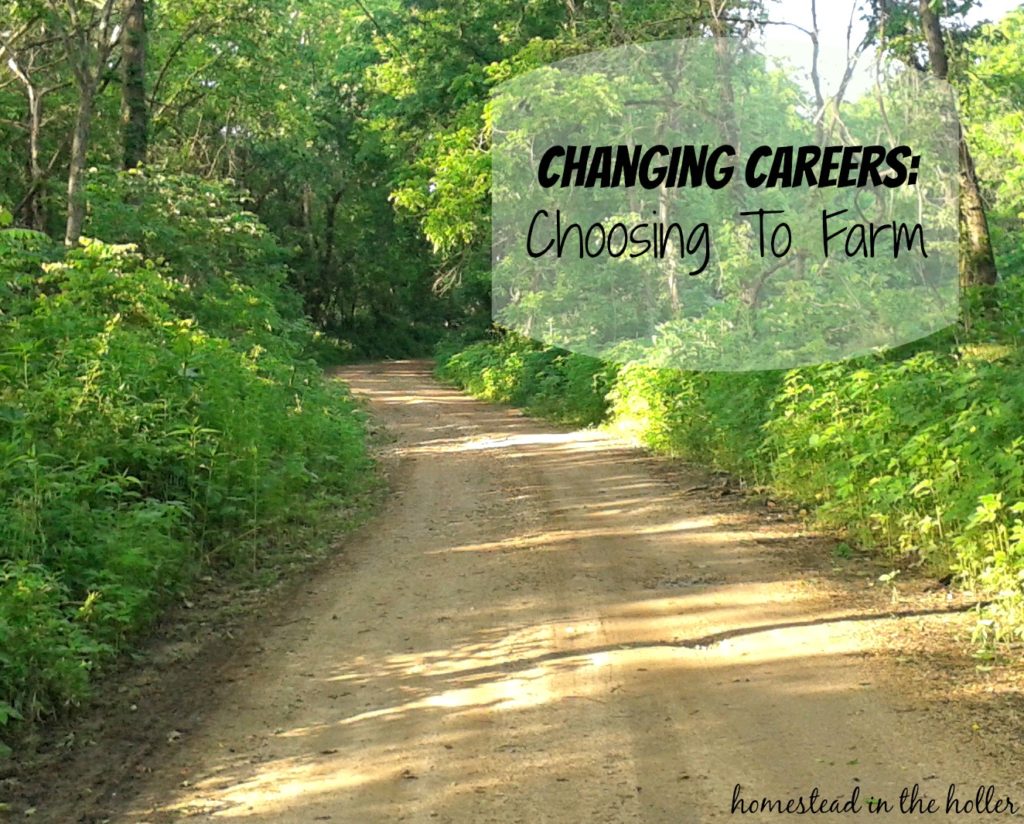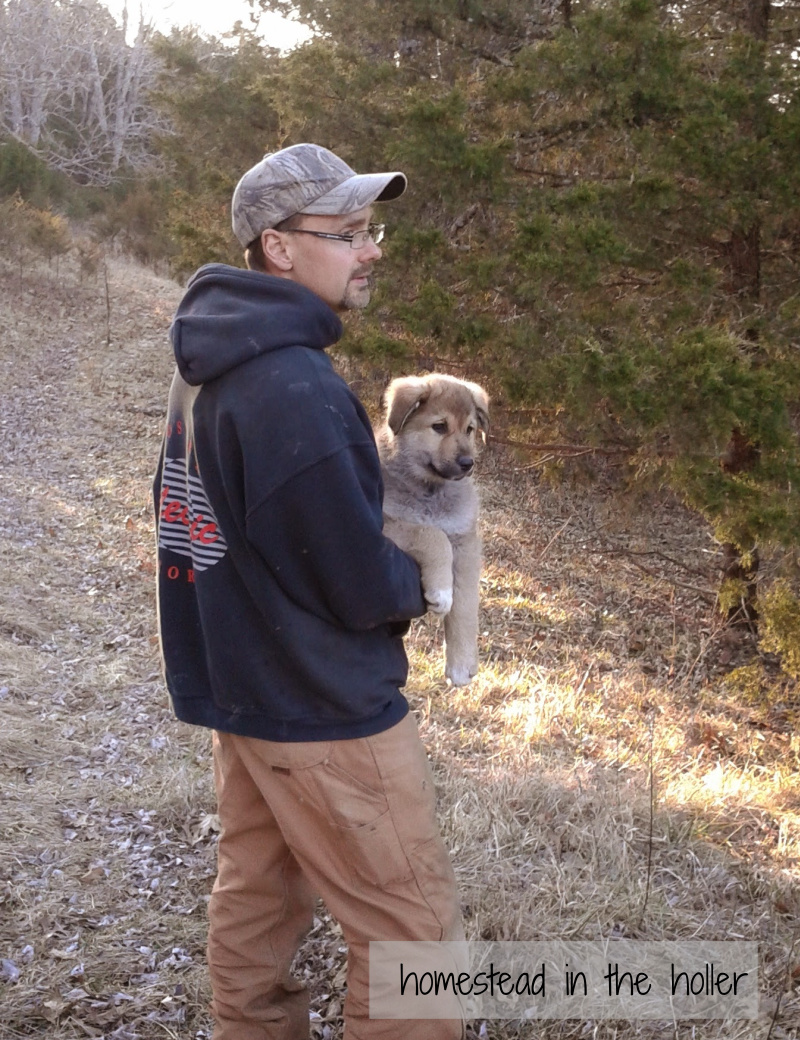 Homestead in the Holler is a participant in the Amazon Services LLC Associates Program, an affiliate advertising program designed to provide a means for sites to earn advertising fees by advertising and linking to amazon.com.
Homestead in the Holler is a participant in the Amazon Services LLC Associates Program, an affiliate advertising program designed to provide a means for sites to earn advertising fees by advertising and linking to amazon.com.
A conventional job is often described as comfortable, stable, or secure. Whether or not that is actually accurate, it can certainly feel that way. However, humans tend to be rather illogical about things and that perceived security may not be as secure as it feels. Regardless, comfortable easily describes many jobs. Routine and known things are somehow comfortable. Branching out into the unknown can certainly be intimidating. This is how I felt when I left the safe, familiar world of engineering and decided to buy a farm. That coupled with my inexperience in the field of farming made it feel extra scary. However, today I’m grateful that we pursued our dreams, even though we haven’t yet fully met all our goals.
Here are some things to think about if you decide to consider a career change. My experience is from engineering to farming/ranching/permaculture so that’s what I’ll share, but I suspect it could apply to more than just those specifics. Keep in mind that I’m not giving advice, just sharing our experiences. As my neighbor always says, free advice is worth just that anyway. Most importantly, try to be honest with yourself throughout this decision making process or else this is a waste of time. Be willing to consider downsides. Don’t look at best-case income/etc unless you also consider worst case or more realistic outcomes.
Not for everyone. Maybe you *shouldn’t* do it.
I think it is important to remember that leaving traditional employment to pursue self-employment isn’t for everyone. That is something only you know, so be honest with yourself and be sure to choose something you truly love. Just escaping a job that wasn’t what you expected might be better done by simply finding another job in your same (or similar) field. It could be that self-employment doesn’t fit you anyway. Are you motivated to get things done yourself or do you need someone to direct you?
Think about the worst case
One thing that helped me was to think about the worst case. Depending on your circumstances, I believe this could either encourage or discourage a person from making a change. Remember to be honest with yourself. In my case, I decided that the absolute worst case was having to sell the farm and find another job in my field. While this would be a huge setback both financially and likely career wise, it was acceptable to us.
Think about WHY you want to do it
It is important to consider what motivates you to consider this change. It could be that there is a much simpler, less risky way to achieve what you are looking for. In my case, a career change felt like the necessary step, because I love the whole idea of farming WITH nature. It is something that excites me and that means it is easy to spend time doing. If that changes, it will be time for another change.
Plan for it, save for it
I think this is very important. We talked about our adventure for many, many years. We saved, we planned. We considered what was important to us and that helped us choose where. In fact, we considered all 50 states and even some other countries and rated each state for the things we cared about. I think jumping into this sort of thing likely wouldn’t be pretty. Our choice for career was agriculture, which can look so appealing from the sofa, but isn’t quite so glamorous in real life. It involves hard work, long hours and sometimes big disappointments. So, remember to plan and again, be realistic with yourself. Consider the work involved and then at least triple those estimates and plan again.
Farming? Plan on a period with little to no income
Starting a farm is a huge undertaking. It takes time, money and lots of work. Remembering that time is money, that list becomes money, money and lots of work. Most painful of all, most agricultural products take quite a lot of time to produce (think beef, etc). Many take a whole lot of time, such as our orchard. Keep this in mind while planning, so you can undertake some shorter term projects that produce an income more quickly, such as vegetables, bushes, sheep and pigs. Remember that you will likely live for quite some time with no or minimal income. Be willing to take an outside job if need be. Try to reduce expenses as much as possible to slow the burn of money.
Have a backup plan
It is most likely that your plan won’t work out quite like you envision. In fact, most things seem to go quite a bit differently than expected. It is even likely that things might not work out at all. Things might not feel right. Whatever it is, what happens at that point? This isn’t something we have put huge amounts of effort into, but there is a list of options there, such as finding a local job, finding more contract work in my field of engineering, and so on.
Be flexible
Be willing to make changes as needed. Hold to your principles, but be willing to bend them to get to where you want to be. I have a hard time with this, but sometimes it is better to get started with something rather than waiting to start at the ideal point (analysis paralysis). An example for us is pigs. We are currently raising pigs in roughly the manner we want, but aren’t moving them as often as we’d like. We aren’t feeding them the diet we’d really like (mostly grown on site or more locally). We don’t have all the infrastructure in place that we need. However, we are managing to raise pigs now and to get a start. We will continue to improve as we go. Eventually we will either reach our goal or we will stop raising pigs, whichever feels right.
Don’t take on too much at once — don’t burn yourself out
It really is easy to over extend yourself. In our case, we often end up getting too many trees/bushes to plant than really fits our available time. It is always tempting to take on just one more animal or one more garden bed. Just be realistic about your available time. If (when) you do reach the breaking point, be willing to let something go. We learned in grazing school that holistic management stresses the importance of lifestyle as well as animal wellness. When you take too much on, both animal wellness and life balance are likely to suffer.
PLAN for animals. PLAN your farm.
We’re back to planning again. I think I emphasize this because I’ve failed so many times. Permaculture design has been a great help for me, because planning/designing is such an important part. When you choose to bring in an animal, be sure to plan for its arrival and understand what is really necessary. This may seem like a contradiction of being flexible, but I don’t think so. Make sure to be able to at least hold and feed animals, even if it isn’t what you’d ideally like. Getting animals without the proper preparation is a recipe for disaster and annoyed neighbors. Sometimes it is hard to pass up a great opportunity, but it isn’t worth the headache of not being prepared. Likewise, be sure to plan out your farm. Consider not building permanent fences immediately. As you use your land, you’ll start to get a feel how you would like things to flow. Being hampered by something you built at the start that you now hate isn’t pleasant. Focus on perimeter fences and build interior fences later. Consider using mobile buildings whenever possible so you aren’t locked into any particular layout. We have found that moveable shelters are a huge help with livestock. If you use black HDPE water pipes, they can be placed above ground until you are sure they are right where you want them, since they are UV stabilized. Once you are ready to commit, you can trench them in.
Keep track of ACTUAL expenses, etc. DO track your hours.
You will probably hear again and again that a farmer can’t keep track of his hours. I strongly disagree. I always keep track (at least roughly) of my time invested in a project. If you look back at a project and find that it only generates say $2/hour and isn’t likely to improve, this is something you should get rid of. There are many, many things to do, so focus on things that *do* pay. Also, keep track of inputs. Without this, you will never know if you make or lose money when you sell eggs for $2/doz or pork chops for $3/lb. I realize that it can be hard to keep good records, because I often don’t do as good of a job as I’d like. However, you will be glad for good records later. Also be sure to track animal events such as births, weaning, etc. It’s amazing how hard it is to remember later.
Don’t be afraid to get help, especially with things that you aren’t familiar with… lawyers, artists, etc
You aren’t going to be an expert at everything when you start your new endeavor. While farming certainly takes a wide range of expertise, there are things you won’t know. Some days I feel like there isn’t anything I *do* know. Seeking help from an attorney when setting up your business just may save you thousands later. Consulting a CPA is likely to pay off quickly, especially if it prevents compliance issues with the government. An artist can make your business look much more polished and make marketing that much easier.
Take classes, read, talk to people, watch people.
There is just so much to learn. Take some classes and make sure to read whatever you can. Then, read some more. I am always finding new, interesting processes that others are trying. Sometimes this may help you to generate still new ideas to try. Make sure to talk to people, even those that do things in a way you don’t agree with. You are an adult, so I trust you can filter out the parts you don’t like. Most likely you can pick up all sorts of ideas from older farmers that have already encountered much of what you’ll see. Watch what others are doing. There is always room to learn.
There will be setbacks – Don’t fear making mistakes
Be prepared for setbacks. There will be things that happen that make you doubt yourself and doubt your choices. These things can be trying for sure, but try to keep a view of the bigger picture. Remember that even mistakes can be valuable if you learn from them. If you do something poorly, resolve to do it better next time.
Be prepared for the doubters
Be prepared for those who say you are crazy or stupid or will regret your decision. I’ve certainly encountered all three. If this gets to you, you might want to consider not going for the change. There is nothing wrong with the comfortable, known path. Or it could be that you’re like me and it’ll just strengthen your resolve and you’ll just say “well, there is only one way to find out”.
If you do decide to go for it, have fun! Do the things you are passionate about. Enjoy life! Slow down. Don’t let the little things get you down. And please share your experiences.

Computer engineer turned full time farmer, grazier, builder, permaculturist and volunteer fire fighter. We left corporate America to live a simple, self-sufficient life in the Ozarks. Read more



5 responses to “Farming: A Career Change”